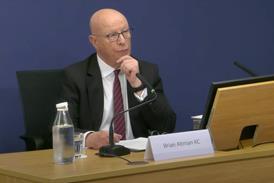Almost 2,000 judges will receive a 7% pay increase as part of the government’s new commitment on public sector spending.
Justice secretary Alex Chalk said today he accepted the recommendation of the Senior Salaries Review Body to award an increase to most judicial office holders for 2023/24. The increase will apply to all salary groups backdated to April 2023.
Chalk said: ‘This award is over double that of last year and will apply to 1,922 salaried judicial office holders. The award will help address judicial recruitment shortfalls, and I have considered affordability and the government’s priority to halve inflation alongside the need for ongoing investment into improving the wider criminal justice system.’
The MoJ will also offer 7% increases for prison officers, 5% increases for prison managers and governors, and an extra £2,000 for lowest paid prison staff. Court and probation staff are subject to different salary reviews.
But there are questions already over where the money will come from and what other areas of justice spending may have to be cut back.
Chalk said the pay award was ‘made affordable by reprioritising spending within the existing budgets’ but did not say what areas would be less of a priority in future.
‘It is affordable in the context of the department’s spending review settlement which provided an extra £3.2bn across this parliament, taking total funding to £11.5bn in 2024/25,’ added Chalk.

That £11.5bn figure includes the £1.5bn allocated to capital spending by the chancellor last autumn.
The MoJ’s departmental budget is due to rise by 4% to £9.8bn in 2023/24 and by a further 2% to £10bn in 2024/25.
Millions of public sector workers including teachers, police and junior doctors are being offered pay rises between 5-7% after months of negotiations and industrial disputes.
Prime minister Rishi Sunak said today that none of the increases would be funded by borrowing more or increasing taxes.
Sunak added: 'Because we only have a fixed pot of money to spend from that means government departments have had to find savings and efficiencies elsewhere in order to prioritise paying public sector workers more.'
This article is now closed for comment.

























6 Readers' comments